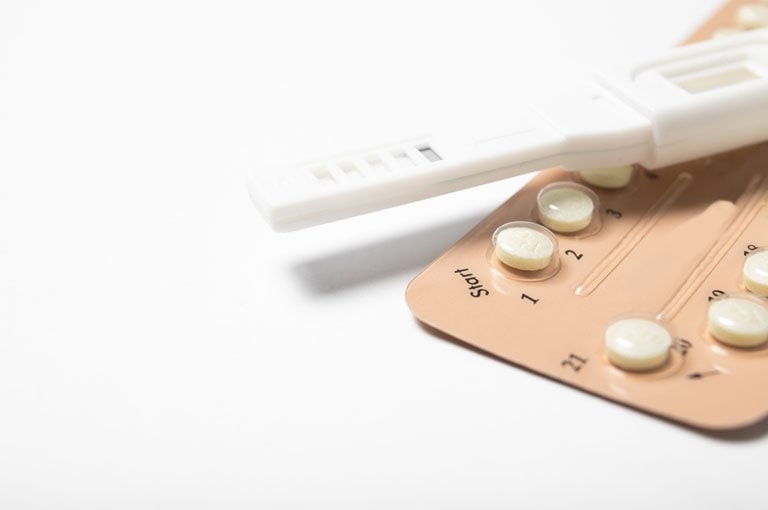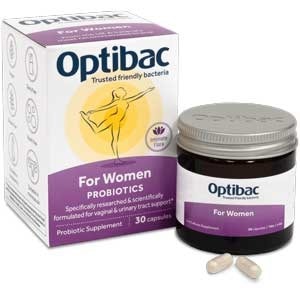You're away from FREE US delivery Free US delivery (applied at checkout) on orders over $60.00
You have qualified for Free US delivery
Suitability
Can you take probiotics with birth control pills?
Yes, you can safely take probiotics with birth control pills. There are no risks to the function of either the birth control pill or the probiotics when taken together.
One of the most popular medications taken by women around the world is the birth control pill, also known as the oral contraceptive pill. This dose of daily hormones is used to prevent pregnancy. Some medications, including specific antibiotics, can affect how well the pill works1. Failure of the birth control pill to work effectively can lead to an unplanned pregnancy. If you are considering taking a probiotic for the first time, you may be wondering if your probiotic supplement can interfere with your birth control pill. Let’s explore this topic further.

Is it safe to take probiotics with birth control pills?
Women can be reassured that probiotics are safe to take with the birth control pill and are not known to affect its function.
Probiotics are friendly bacteria and yeasts that are beneficial for our overall health. They are not a drug. Naturally, our gut is the home to trillions of microbes including bacteria and yeasts which is known as the gut microbiome. By taking a probiotic supplement, we are topping up the levels of good microbes in our gut and in turn, contributing to a healthy gut microbiome. To learn more about the microbiome, read All about the microbiome on the Probiotics Learning Lab.
Does the birth control pill affect the gut microbiome?
The birth control pill has been noted to have effects on the gut microbiome and gut health. Although it is unclear why, there is an established connection between use of the birth control pill and the risk of gut disorders2. It has been suggested that this is due to the relationship between the effects of oestrogen on the gut microbiome, the integrity of the lining of the gut and immune health. Some women experience gastrointestinal side effects when taking the birth control pill including nausea, bloating and altered bowel pattern. This could be a sign that there is an imbalance in the gut microbiome, known as dysbiosis. Taking a probiotic supplement can help to support the gut microbiome alongside the birth control pill when experiencing digestive upset. If you would like to learn more about dysbiosis - head over to the Learning Lab and read our article: What is dysbiosis?
Does the birth control pill affect your vaginal health?
The birth control pill has been known to increase risk of developing vulvovaginal thrush3. It is thought that the hormone oestrogen, including the synthetic oestrogens found in many birth control pills, can encourage the growth of Candida in the vagina, contributing to the development of thrush4. If you find that you tend to suffer from vaginal infections, it may in fact be beneficial to consider a probiotic which supports the health of the vaginal microbiome, such as Optibac For Women.

Healthcare professionals can read more about the use of probiotics for intimate health by reading Which probiotics help with thrush? on the Probiotic Professionals site.
Vitamin C and the birth control pill
Vitamin C and the birth control pill are initially broken down by the same enzymes before being used in the body. It was found in early studies that in high doses of 1g or more per day, vitamin C could increase circulating oestrogen levels in the body5. However, further studies did not confirm this finding6,7. Dietary sources of vitamin C and healthy amounts of vitamin C supplements for example in line with the recommended daily allowance of 80mg per day8, is safe while taking the birth control pill.
Ultimately, if you are unsure about the use of any medication or natural supplement alongside your birth control pills, then consult with your doctor.
Summary
- Probiotics are safe to take with the birth control pill.
- The birth control pill can impact the health of our gut and vaginal microbiomes.
- Taking a probiotic supplement whilst on the birth control pill can be beneficial in supporting our gut and intimate health.
You may also like to read the following articles on the Probiotic Learning Lab site:
Gut Health: All you need to know
References
- Altman RD, Nielsen NH, Sterling ML, Dickinson BD. Drug interactions between oral contraceptives and antibiotics. Obstet Gynecol. 2002;99(5):842. doi:10.1097/00006250-200205000-00031
- Khalili H. Risk of Inflammatory Bowel Disease with Oral Contraceptives and Menopausal Hormone Therapy: Current Evidence and Future Directions. Physiol Behav. 2016;39(3):193-197. doi:10.1007/s40264-015-0372-y.Risk
- Spinillo A, Capuzzo E, Nicola S, Baltaro F, Ferrari A, Monaco A. The impact of oral contraception on vulvovaginal candidiasis. Contraception. 1995;51(5):293-297. doi:10.1016/0010-7824(95)00079-P
- Gonçalves B, Ferreira C, Alves CT, Henriques M, Azeredo J, Silva S. Vulvovaginal candidiasis: Epidemiology, microbiology and risk factors. Crit Rev Microbiol. 2016;42(6):905-927. doi:10.3109/1040841X.2015.1091805
- Back DJ, Breckenridge AM, MacIver M, L’E Orme M, Purba H, Rowe PH. Interaction of ethinyloestradiol with ascorbic acid in man. Br Med J (Clin Res Ed). 1981;282(6275):1516. doi:10.1136/bmj.282.6275.1516
- Kuhnz W, Louton T, Back DJ, Zamah NM. Influence of High Doses of Vitamin C on the Bioavailability and the Serum Protein Binding of Levonorgestrel in Women Using a Combined Oral Contraceptive. 1995;7624(94).
- Zamah NM, Hümpel M, Kuhnz W, Louton T, Rafferty J, Back DJ. Absence of an effect of high vitamin C dosage on the systemic availability of ethinyl estradiol in women using a combination oral contraceptive. Contraception. 1993;48(4):377-391. doi:10.1016/0010-7824(93)90083-J
- UK Coma/SACN. Nutrition requirements. 2016. doi:10.1300/5513_12